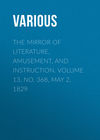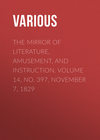Kitobni o'qish: «The Atlantic Monthly, Volume 11, No. 64, February, 1863»
SOVEREIGNS AND SONS
The sudden death of Prince Albert caused profound regret, and the Royal Family of Britain had the sincere sympathies of the civilized world on that sad occasion. The Prince Consort was a man of brilliant talents, and those talents he had cultivated with true German thoroughness. His knowledge was extensive, various, and accurate. There was no affectation in his regard for literature, art, and science; for he felt toward them all as it was natural that an educated gentleman of decided abilities, and who had strongly pronounced intellectual tastes, should feel. Though he could not be said to hold any official position, his place in the British Empire was one of the highest that could be held by a person not born to the sceptre. His knowledge of affairs, and the confidence that was placed in him by the sovereign, made it impossible that he should not be a man of much influence, no matter whether he was recognized by the Constitution or not. As the director of the education of the princes and princesses, his children, his character and ideas are likely to be felt hereafter, when those personages shall have become the occupants of high and responsible stations. The next English sovereign will be pretty much what he was made by his father; and it is no light thing to have had the formation of a mind that may be made to act, with more or less directness, on the condition of two hundred millions of people.
We know it is the custom to speak of the Government of England as if there were no other powerful institution in that Empire than the House of Commons; and that very arrogant gentleman, Mr. John Arthur Roebuck, has told us, in his usual style, that the crown is a word, and nothing more. "The crown!" exclaimed the member for Sheffield, in 1858,—"the crown! it is the House of Commons!" Theoretically Mr. Roebuek is right, and the British practice conforms to the theory, whenever the reigning prince is content to receive the theory, and to act upon it: but all must depend upon that prince's character; and should a British sovereign resolve to rule as well as to reign, he might give the House of Commons much trouble, in which the whole Empire would share. The House of Commons was never stronger than it was in the latter part of 1760. For more than seventy years it had been the first institution in the State, and for forty-six years the interest of the sovereign had been to maintain its supremacy. The king was a cipher. Yet a new king had but to appear to change everything. George III. ascended the throne with the determination not to be the slave of any minister, himself the slave of Parliament; and from the day that he became king to the day that the decline of his faculties enforced his retirement, his personal power was everywhere felt, and his personal character everywhere impressed itself on the British world, and to no ordinary extent on other countries. George III. was not a great man, and it has been argued that his mind was never really sound; and yet of all men who then lived, and far more than either Washington or Napoleon, he gave direction and color and tone to all public events, and to not a little of private life, and much of his work will have everlasting endurance. He did not supersede the House of Commons, but he would not be the simple vizier of that many-headed sultan, which for the most part became his humble tool. Yet he was not a popular sovereign until he had long occupied the throne, and had perpetrated deeds that should have destroyed the greatest popularity that sovereign ever possessed. It was not until after the overthrow of the Fox-and-North Coalition that he found himself popular, and so he remained unto the end. The change that he wrought, and the power that he wielded in the State,—a power as arbitrary as that of Louis XV.,—were the fruits of his personal character, and that character was the consequence of the peculiar education which he had received.
Lord Brougham tells us that George III. "was impressed with a lofty feeling of his prerogative, and a firm determination to maintain, perhaps extend it. At all events, he was resolved not to be a mere name or a cipher in public affairs; and whether from a sense of the obligations imposed upon him by his station, or from a desire to enjoy all its powers and privileges, he certainly, while his reason remained entire, but especially during the earlier period of his reign, interfered in the affairs of government more than any prince who ever sat upon the throne of this country since our monarchy was distinctly admitted to be a limited one, and its executive functions were distributed among responsible ministers. The correspondence which he carried on with his confidential servants during the ten most critical years of his life lies before us, and it proves that his attention was ever awake to all the occurrences of the government. Not a step was taken in foreign, colonial, or domestic affairs, that he did not form his opinion upon it, and exercise his influence over it. The instructions to ambassadors, the orders to governors, the movements of forces, down to the marching of a single battalion, in the districts of this country, the appointment to all offices in Church and State, not only the giving away of judgeships, bishoprics, regiments, but the subordinate promotions, lay and clerical,—all these form the topics of his letters; on all his opinion is pronounced decisively; in all his will is declared peremptorily. In one letter he decides the appointment of a Scotch puisne judge; in another the march of a troop from Buckinghamshire into Yorkshire; in a third the nomination to the Deanery of Westminster; in a fourth he says, that, 'if Adam, the architect, succeeds Worsley at the Board of Works, he shall think Chambers ill used.' For the greater affairs of State it is well known how substantially he insisted upon being the king de facto as well as de jure. The American War, the long exclusion of the Liberal party, the French Revolution, the Catholic question, are all sad monuments of his real power."
This is a true picture of George III., and why it should be supposed that no descendant of that monarch will ever be able to make himself potently felt in the government of his Empire we are at a loss to understand. The exact part of that monarch would not be repeated, the world having changed so much as to render such repetition impossible; but the end at which George III. aimed, and which he largely accomplished for himself, that end being the vindication of the monarchical element in the British polity, might be undertaken by one of his great-grandsons with every reason to expect success. The means employed would have to be different from those which George III. made use of, but that would prove nothing against the project itself. The men who followed Cromwell to the Long Parliament and the men who followed Bonaparte into the Council of Five Hundred were differently clothed and armed, but the pikemen of the future Protector were engaged in the same kind of work that was afterward done by the grenadiers of the future Emperor. The one set of men had never heard of the bayonet, and the other set had faith in nothing but the bayonet, believing it to be as "holy" as M. Michelet asserts it to be. The pikemen were the most pious of men, and could have eaten an Atheist with relish, after having roasted him. The grenadiers were Atheists, and cared no more for Christianity than for Mahometanism, their chief having testified his regard for the latter, and consequently his contempt for both, only the year before, in Egypt. Yet both detachments were successfully employed in doing the same thing, and that was the clearing away of what was regarded as legislative rubbish, in order that military monarchies might be erected on the cleared ground. In each instance there was the element of violence actively at work, and it makes no possible difference that the English Commons went out because they did not care to come to push of pike, and that the French Representatives departed rather than risk the consequence of a bayonet-charge. So if the Prince of Wales should see fit to tread in the footsteps of his great-grandfather, he would have very different instruments from those "king's friends" whose existence and actions were so fatal to ministers in the early part of those days when George III. was king.
It is a common remark, that the institutions of England have been so far reformed in a democratic direction, that no monarch could ever expect to become powerful in that country. We think the observation unphilosophical; and it is because the old aristocratical system of England received a heavy blow in 1832 that we believe a king of that country could make himself a ruler in fact as well as in theory. Between a king and an aristocracy there never can be anything like a sincere attachment, unless the king be content to be recognized as the first member of the patrician order, to be primus inter pares in strict good faith, an agent of his class, but not the sovereign of his kingdom. Kings generally prefer new men to men of established position and old descent. They have a fondness for low-born favorites, who are not only cleverer than most aristocrats will condescend to be, but who recognize a chief in a monarch, and enable him to feel and to enjoy his superiority when in their company. The hostility that prevails between the peer and the parvenu is the most natural thing in the world, and is no more to be wondered at than that between the hare and the hound. In earlier times the peerage had the best of it, and could hang up the parvenus with wonderful despatch,—as witness the fate of Cochrane and his associates, favorites of the third James of Scotland, who swung in the wind over Lauder Bridge. In later times brains and intelligence tell in and on the world, and the peers, having no longer pit and gallows for the punishment of presumptuous plebeians who dare to get between them and the regal sunshine, must be content to see those plebeians basking in the royal rays, if they are not capable of outdoing them in those arts that ever have been found most useful in the advancement of the interest of courtiers. Hanging and heading have gone mostly out of date, or the peer would be in more danger than the upstart.
The Reform Bill has made it much easier for a king of Great Britain to become a ruler than it was for George III. to carry his point over the old aristocracy, for it has created a class of voters who could be easily won over to the aid of a king engaged in a project that should not injure them, while its success should reduce the power of the aristocracy. The father of the Reform Bill made a strange mistake as to the character of that measure. "I hope," said the old Tory and Pittite, Lord Sidmouth, to him, "God will forgive you on account of this bill: I don't think I can." "Mark my words," was Earl Grey's answer,—"within two years you will find that we have become unpopular for having brought forward the most aristocratic measure that ever was proposed in Parliament." The great Whig statesman was but half right. The Whigs became unpopular within the time named, but it was for very different reasons from that assigned by Earl Grey in advance for their fall in the people's favor. The Reform Bill, instead of proving an aristocratic measure, has wellnigh rendered aristocratical government impossible in England; and as a democracy in that country is as much out of the question as a well-ordered monarchy is in America, a return to a true regal government would seem to be the only course left for England, if she desires to have a strong government. When the Duke of Wellington, seeing the breaking up of the old system because of the triumph of the Whig measure, asked the question, "How is the King's government to be carried on?" he meant, "How will it be possible to maintain the old aristocratical system of party-government?"
Since the grand organic change that was effected thirty years ago, there has been no strong and stable government in England. Lord Grey went out of office because he could not keep his party together. The King, under the spurring of his wife, made an effort to play the part of his father in 1783, with Peel for Pitt, and was beaten. Peel was floored, and Lord Melbourne became Premier again; and though he held office six years, he never had a working majority in the Commons, nor a majority of any kind in the Peers. The largest majorities that he could command in the lower House would have been considered something like very weak support in the ante-Reform times, and would have caused the ministers of those times to resign themselves to resignation. When the Tories came back to power, in 1841, with about one hundred majority in the Commons, they thought they were secure for a decade at least; but in a few months they found they were not secure of even their own chief; and in five years they were compelled to abandon protection, and to consent to the death and burial of their own party, which was denied even the honor of embalmment, young Conservatism being nothing but old Toryism, and therefore it was beyond even the power of spices to prolong its decay. It had rotted of the potato-rot, and the League's powerful breath blew it over. The Whigs returned to office, but not to power, the Russell Government proving a most ridiculous concern, and living through only five years of rickety rule. A spasmodic Tory Government, that discarded Tory principles, endured for less than a year, not even the vigorous intellect of the Earl of Derby, seconded though it was by the genius of Disraeli, being sufficient to insure it a longer term of existence. Then came the Aberdeen Ministry, a regular coalition concern, a no-party government, and necessarily so, because all parties but the extreme Tories were represented in it, and were engaged in neutralizing each other. How could there be a party government, or, indeed, for long a government of any kind, by a ministry in which were such men as Aberdeen and Russell, Palmerston and Grahame, Gladstone and Clarendon, all pigging together in the same truckle-bed, to use Mr. Burke's figure concerning the mixture that was called the Chatham Ministry? The coalition went to pieces on the Russian rock, having managed the war much worse than any American Administration ever mismanaged one. The Palmerston Government followed, and has existed ever since, deducting the fifteen months that the second Derby-Disraeli Ministry lasted; but the Palmerston Ministry has seldom had a majority in Parliament, and has lived, partly through the forbearance of its foes, partly through the support of men who are neither its friends nor its enemies, and partly through the personal popularity of its vigorous old chief, who is as lively at seventy-eight as he was at forty-five, when he was a Canningite. Ministries now maintain themselves because men do not know what might happen, if they were to be dismissed; and this has been the political state of England for more than a quarter of a century, with no indications of a change so long as the government shall remain purely Parliamentary in its character, Parliament meaning the House of Commons. There is no party in the United Kingdom capable of electing a strong majority to the House of Commons, and hence a strong government is impossible so long as that body shall control the country. With the removal of Lord Palmerston something like anarchy might be expected, there being no man but him who is competent to keep the Commons in order without the aid of a predominating party. The tendency has been for some time to lean upon individuals, at the same time that the number of individuals possessed of influence of the requisite character has greatly diminished. Sir Robert Peel, had he lived, would have been all that Lord Palmerston is, and more, and would have been more acceptable to the middle class than is the Irish peer.
The state of things that is thus presented, and which must become every year of a more pronounced character, is one that would be highly favorable to the exertions of a prince who should seek to make himself felt as the wielder of the sceptre, and who should exert himself to rise from the presidency of an aristocratical corporation, which is all that a British monarch now is, to the place of king of a great and free people. A prince with talent, and with a hold on the affection of his nominal subjects, might confer the blessing of strong government on Britain, and rule over the first of empires, instead of being a mere doge, or, as Napoleon coarsely had it, a pig to fatten at the public expense. The time would appear to be near at hand when England shall be the scene of a new struggle for power, with the aristocracy on the one side, and the sovereign and most of the people on the other. A nation like England cannot exist long with weakness organized for its government, and there is nothing in the condition of Parliament or of parties that allows us to suppose that from them strength could proceed, any more than that grapes could be gathered from thorns or figs from thistles. A monarch who should effect the change indicated might be called a usurper, and certainly would be a revolutionist; but, as Mommsen says, "Any revolution or any usurpation is justified before the bar of history by exclusive ability to govern,"—and government is what most nations now stand most in need of. The reason why George III.'s conduct is generally condemned is, that he was a clumsy creature, and that he made a bad use of the power which he monopolized, or sought to monopolize, his whole course being unrelieved by a single trait of genius, or even of that tact which is the genius of small minds.
It has been charged upon the princes of the House of Hanover that they are given to quarrelling, and that between sovereign and heir-apparent there has never been good-will, while they have on several occasions disgusted the world by the vehemence of their hatred for each other. That George I. hated his heir is well known; and George II. hated his son Frederick with far more intensity than he himself had been hated by his own father. The Memoirs of Lord Hervey show the state of feeling that existed in the English royal family during the first third of the reign of George II., and the spectacle is hideous beyond parallel; and for many years longer, until Frederick's death, there was no abatement of paternal and filial hate. George III. was disgusted with his eldest son's personal conduct and political principles, as well he might be; for while the father was a model of decorum, and a bitter Tory, the son was a profligate, and a Whig,—and the King probably found it harder to forgive the Whig than the profligate. The Prince cared no more for Whig principles than he did for his marriage-vows, but affected them as a means of annoying his father, whose Toryism was of proof. He, as a man, toasted the buff and blue, when that meant support of Washington and his associates, for the same reason that, as a boy, he had cheered for Wilkes and Liberty,—because it was the readiest way of annoying his father; but he ever deserted the Whigs when his aid and countenance could have been useful to them. George IV. had no child with whom to quarrel, but while Prince Regent he did his worst to make his daughter unhappy, as we find established in Miss Knight's Memoirs. The good-natured and kind-hearted William IV. had no legitimate children, but he was strongly attached to the Fitzclarences, who were borne to him by Mrs. Jordan. Indeed, monarchs have often been as full of love for their offspring born out of wedlock as of hate for their children born in that holy state. Being men, they must love something, and what so natural as that they should love their natural children, whose helpless condition appeals so strongly to all their better feelings, and who never can become their rivals?
Queen Victoria is the first sovereign of the House of Hanover who, having children, has not pained the world by quarrelling with them. A model sovereign, she has not allowed an infirmity supposed to be peculiar to her illustrious House to control her clear and just mind, so that her career as a mother is as pleasing as her career as a sovereign is splendid. About the time of the death of Prince Albert, a leading British journal published some articles in which it was insinuated, not asserted, that there had been trouble in the Royal Family, and that that quarrelling between parent and child which had been so common in that family in former times was about to be exhibited again. It was even said that domestic peace was an impossibility in the House of Hanover, which was but an indorsement of Earl Granville's remark, in George II.'s reign. "This family," said that eccentric peer, "always has quarrelled, and always will quarrel, from generation to generation"; and he did not live to see the ill feeling that existed between George III. and his eldest son.
There is no reason for saying that the Hanover family is more quarrelsome than most other royal lines; and the domestic dissensions of great houses are more noted than those of lesser houses only because kings and nobles are so placed as to live in sight of the world. When a king falls out with his eldest son, the entertainment is one to which all men go as spectators, and historians consider it to be the first of their duties to give full details of that entertainment. Since the Hanoverians have reigned over the English, the world has been a writing and a reading world, and nothing has more interested writers and readers than the dissensions of sovereigns and their sons. If we extend our observation to those days when German sovereigns were unthought of in England, we shall find that kings and princes did not always agree; and if we go farther, and scan the histories of other royal houses, we shall learn that it is not in Britain alone that the wearers of crowns have looked with aversion upon their heirs, and have had sons who have loved them so well and truly as to wish to witness their promotion to heavenly crowns. The Hanoverian monarchs of England, and their sons, have shared only the common lot of those who reign and those who wish to reign.
The Norman kings of England did not always live on good terms with their sons. William the Conqueror had a very quarrelsome family. His children quarrelled with one another, and the King quarrelled with his wife. The oldest son of William and Matilda was Robert, afterward Duke of Normandy,—and a very trying time this young man caused his father to have; while the mother favored the son, probably out of revenge for the beatings she had received, with fists and bridles, from her royal husband, who used to swear "By the Splendor of God!"—his favorite oath, and one that has as much merit as can belong to any piece of blasphemy,—that he never would be governed by a woman. The father and son went to war, and they actually met in battle, when the son ran the old gentleman through the arm with his lance, and dropped him out of the saddle with the utmost dexterity. This was the first time that the Conqueror was ever conquered, and perhaps it was not altogether without complacency that "the governor" saw what a clever fellow his eldest son was with his tools. At the time of William's death Robert was on bad terms with him, and is believed to have been bearing arms against him. Henry I. lost his sons before he could well quarrel with them, the wreck of the White Ship causing the death of his heir-apparent, and also of his natural son Richard. He compensated for this omission by quarrelling with his daughter Matilda, and with her husband, Geoffrey of Anjou. He made war on his brother Robert, took from him the Duchy of Normandy, and shut him up for life; but the story, long believed, that he put out Robert's eyes, has been called in question by modern writers. King Stephen, who bought his breeches at so low a figure, had a falling-out with his son Eustace, when he and Henry Plantagenet sought to restore peace to England, and nothing but Eustace's death made a settlement possible. William Rufus, the Red King, who was the second of the Norman sovereigns of England, had no legitimate children, for he was never married. He was a jolly bachelor, and as such he has had the honor of having his history written by one of the ablest literary ladies of our time, Miss Agnes Strickland. He was the only king of England, who arrived at years of indiscretion, who did not marry. The other bachelor kings were Edward V. and Edward VI., whose united ages were short of thirty years. His character does not tend to make the single state of man respected. "Never did a ruler die less regretted than William Rufus," says Dr. Lappenberg, "although still young, being little above forty, not a usurper, and successful in his undertakings. He was never married, and, besides the crafty and officious tools of his power, was surrounded only by a few Normans of quality, and harlots. In his last struggle with the clergy, the most shameless rapacity is especially prominent, and so glaring, that, notwithstanding some exaggerations and errors that may be pointed out in the Chronicles, he still appears in the same light. Effeminacy, drunkenness, gluttony, dissoluteness, and unnatural crimes were the distinguishing characteristics of his court. He was himself an example of incontinence." This is a nice character to travel with down the page of history. He quarrelled with his brothers, and with his uncle, and kept up the family character in an exceedingly satisfactory manner, considering that he was unmarried. The statement that he was slain by Walter Tirel, accidentally, in the New Forest, is now disregarded. Our theory of his death is, that he fell a victim to the ambition of his brother, Henry I., who succeeded him, and who certainly had good information as to his fall, and made good use of it, like a sensible fellow.
Of all the royal races of the Middle Ages, no one stands out more boldly on the historic page than the Plantagenets, who ruled over England from 1154 to 1485, the line of descent being frequently broken, and family quarrels constantly occurring. They were a bold and an able race, and if they had possessed a closer resemblance to the Hapsburgs, they would have become masters of Western Europe; but their quarrelsome disposition more than undid all that they could effect through the exercise of their talents. On the female side they were descended from the Conqueror; and, as we have seen, the Conqueror's family was one in which sons rebelled against the fathers, and brother fought with brother. Matilda, daughter of Henry I., became the wife of Geoffrey, Count of Anjou, and from their union came Henry II., first of the royal Plantagenets. Now the Angevine Plantagenets were "a hard set," as we should say in these days. Dissensions were common enough in the family, and they descended to the offspring of Geoffrey and Matilda, being in fact intensified by the elevation of the House to a throne. Henry II. married Eleanora of Aquitaine, one of the greatest matches of those days, a marriage which has had great effect on modern history. The Aquitanian House was as little distinguished for the practice of the moral virtues as were the lines of Anjou and Normandy. One of the Countesses of Anjou was reported to be a demon, which probably meant only that her husband had caught a Tartar in marrying her; but the story was enough to satisfy the credulous people of those times, who, very naturally, considering their conduct, believed that the Devil was constant in his attention to their affairs. It was to this lady that Richard Cocur de Lion referred, when he said, speaking of the family contentions, "Is it to be wondered at, that, coming from such a source, we live ill with one another? What comes from the Devil must to the Devil return." With such an origin on his father's side, crossing the fierce character of his mother, Henry II. thought he could not do better than marry Eleanora, whose origin was almost as bad as his own. Her grandfather had been a "fast man" in his youth and middle life, and it was not until he had got nigh to seventy that he began to think that it was time to repent. He had taken Eleanora's grandmother from her husband, and a pious priest had said to them, "Nothing good will be born to you," which prediction the event justified. The old gentleman resigned his rich dominions, supposed to be the best in Europe, to his grand-daughter, and she married Louis VII., King of France, and accompanied him in the crusade that he was so foolish as to take part in. She had women-warriors, who did their cause immense mischief; and unless she has been greatly scandalized, she made her husband fit for heaven in a manner approved neither by the law nor the gospel. The Provençal ladies had no prejudices against Saracens. After her return to Europe, she got herself divorced from Louis, and married Henry Plantagenet, who was much her junior, she having previously been the mistress of his father. It was a mariage de convenance, and, as is sometimes the case with such marriages, it turned out very inconveniently for both parties to it. It was not unfruitful, but all the fruit it produced was bad, and to the husband and father that fruit became the bitterest of bitter ashes. No romancer would have dared to bring about such a scries of unions as led to the creation of Plantagenet royalty, and to so much misery as well as greatness. There is no exaggeration in Michelet's lively picture of the Plantagenets. "In this family," he says, "it was a succession of bloody wars and treacherous treaties. Once, when King Henry had met his sons in a conference, their soldiers drew upon him. This conduct was traditionary in the two Houses of Anjou and Normandy. More than once had the children of William the Conqueror and Henry II. pointed their swords against their father's breast. Fulk had placed his foot on the neck of his vanquished son. The jealous Eleanora, with the passion and vindictiveness of her Southern blood, encouraged her sons' disobedience, and trained them to parricide. These youths, in whose veins mingled the blood of so many different races,—Norman, Saxon, and Aquitanian,—seemed to entertain, over and above the violence of the Fulks of Anjou and the Williams of England, all the opposing hatreds and discords of those races. They never knew whether they were from the South or the North: they only knew that they hated one another, and their father worse than all. They could not trace back their ancestry, without finding, at each descent, or rape, or incest, or parricide." Henry II. quarrelled with all his sons, and they all did him all the mischief they could, under the advice and direction of their excellent mother, whom Henry imprisoned. A priest once sought to effect a reconciliation between Henry and his son Geoffrey. He went to the Prince with a crucifix in his hand, and entreated him not to imitate Absalom.



















